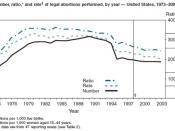Abortion Should Be Kept Out of The Criminal Code
Abortion, termination of pregnancy before the fetus is capable of
independent life. When the expulsion from the womb occurs after the fetus
becomes viable (capable of independent life), usually at the end of six months
of pregnancy, it is technically a premature birth.
The practice of abortion was widespread in ancient times as a method of
birth control. Later it was restricted or forbidden by most world religions, but
it was not considered an offense in secular law until the 19th century. During
that century, first the English Parliament and then American state legislatures
prohibited induced abortion to protect women from surgical procedures that were
at the time unsafe, commonly stipulating a threat to the woman's life as the
sole ("therapeutic") exception to the prohibition. Occasionally the exception
was enlarged to include danger to the mother's health as well.
Legislative action in the 20th century has been aimed at permitting the
termination of unwanted pregnancies for medical, social, or private reasons.
Abortions at the woman's request were first allowed by the Soviet Union in 1920,
followed by Japan and several East European nations after World War II. In the
late 1960s liberalized abortion regulations became widespread. The impetus for
the change was threefold: (1) infanticide and the high maternal death rate
associated with illegal abortions, (2) a rapidly expanding world population, (3)
the growing feminist movement. By 1980, countries where abortions were permitted
only to save a woman's life contained about 20 percent of the world's population.
Countries with moderately restrictive laws--abortions permitted to protect a
woman's health, to end pregnancies resulting from rape or incest, to avoid
genetic or congenital defects, or in response to social problems such as
unmarried status or inadequate income--contained some 40 percent of the world's...



Abortion
I like the way you expressed your view about this abortion subject. People dont have the right to judge a pregnant woman or to make decisions for her. I think that everyone should support the individual, for whatever she wants to do, and not to condemned her when she opted for abortion. She, who opted for abortion would have her own view of the pros and cons, it is her right to abort her unborn, not the government's business or any other's.
2 out of 3 people found this comment useful.